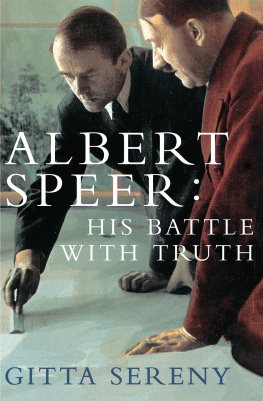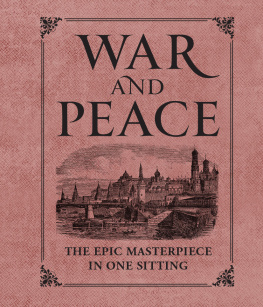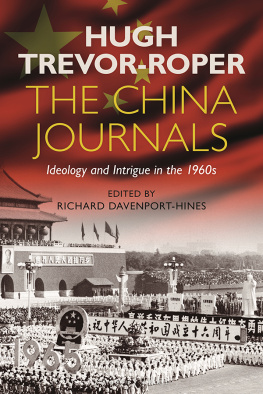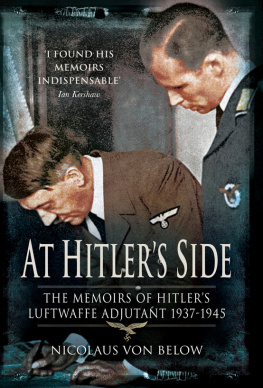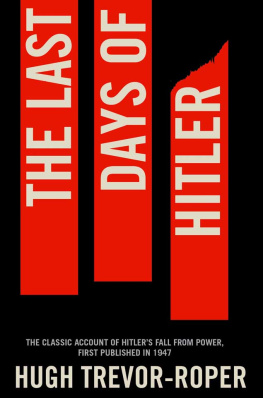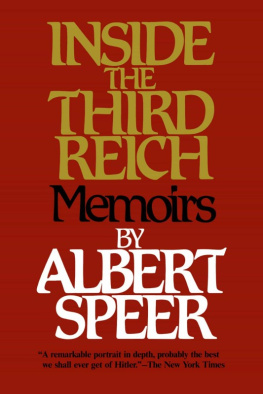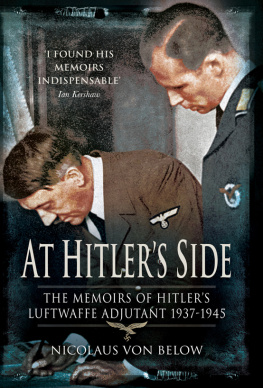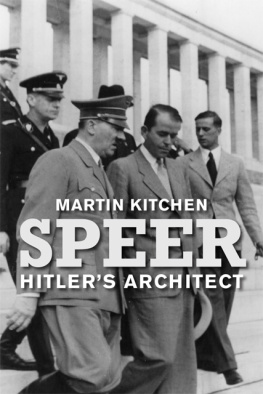
To my children, and theirs;
to your children, and theirs
List of Illustrations
Introduction
A LBERT S PEER , whom I knew well and grew to like, might easily have been hanged the night of 1617 October 1946 when, in the gymnasium of Nuremberg prison, ten others of Hitlers men were executed, some perhaps less guilty than he. The fatalistic part of Speerfor he was always a man not only of many parts but divided in himselfcertainly expected that he would be sentenced to death, and many people afterwards thought he should have been.
The condemned men did not know the date of their execution, but Dr Ludwig Pflcker, the prison doctor, had been told and was very busy that night. On the first floor, the one above both the gymnasium and the cells containing the men sentenced to die, the seven men who had been given prison sentences had been issued the mild sleeping pills they were offered each night at Nuremberg. (Speer always accepted his.) And then, in a compassionate gesture by the Allied prison authorities about which Dr Pflcker had told Speer a few days earlier, the doctor had been allowed to give a stronger sedative to the condemned men. Not all of them, it appears, had taken it: when at 1 a.m. Colonel Burton C. Andrus, the American commandant of the prison, accompanied by selected German witnesses, had gone from cell to cell and, standing in the open doors, had read the death sentence ending with the words death by hanging, the condemned men had all been dressedthe two generals, Keitel and Jodl, in their uniforms devoid of decorations, the others in civilian suits devoid of tiesonly four of them, three almost somnolent, one nearly demented, had failed to stand up straight for the words.
Despite the sedative, it would appear that Speer slept lightly, for in the depth of that night he shot up in his bunk hearing the calling out of names: Ribbentrop (Hitlers Minister for Foreign Affairs); then Keitel (Field Marshal and Army Chief of Staff at Hitlers HQ); Kaltenbrunner (Head of Reich Main Security Office); Rosenberg (Minister for Occupied Eastern Territories); Frank (Governor-General of Poland); Frick (Minister of the Interior); Streicher (Gauleiter and anti-Semitic propagandist); Sauckel (Gauleiter and Reich Commissioner for Foreign Labour); Jodl (General of the Army at Hitlers HQ); and lastit had taken two and a half hours from beginning to endSeyss-Inquart (Reich Commissioner for the Netherlands).
He had known all these men very well; two of them, Jodl and Seyss-Inquart, he had liked. With Sauckel, his unattractive working-class lieutenant in the slave labour programme, as Airey Neave described him in his remarkable book Nuremberg, he had, by necessity, worked closely. Gring, who was in a position to pay well to learn of the executions in time, had managed to commit suicide a few hours before he was to be hanged. He had sometimes been almost a friend of Speers, but became a venomous enemy at Nuremberg, where they fought a last bitter leadership battle.
Gring, insisting the trial was a travesty conducted by victors against losers, wanted all the accused to reject the validity of the court and claim innocence before the German law under which they had lived and which, he held, had legitimized their actions.
Speer, on the contrary, asked them all to join him in a recognition of a universal law under which they, as part of Hitlers leadership, had to accept responsibility for actscrimes in the eyes of all of the civilized worldfor which they, but not the German people, could and should be called to account. Whether they had individually collaborated in the crimes or not, in their capacity as leaders, he said, they had to accept a common culpability just as, had Hitler been victorious, they would have accepted the homage of the people for the common triumph.
The morning after the hangings, the seven men who were given prison sentencesAdmirals Erich Raeder and Karl Dnitz (life and ten years, respectively); Hitlers old comrade and deputy, Rudolf Hess (life); Minister of Economics Walther Funk (life); former Foreign Minister and Reich Protector of Bohemia and Moravia Konstantin von Neurath (fifteen years); Reich Youth Leader and Gauleiter of Vienna Baldur von Schirach, and Speer, first Hitlers architect then his Minister of Armaments and War Production (both twenty years)were moved down into empty cells on the ground floor and were then assigned to clean out those just vacated by the hanged men. Eight of the cells bore the signs of desperate men: papers strewn all over the floor, remnants of food on the tables, blankets balled up on the bunks. Only General Jodls cell was spotless, his tin bowl and spoon washed, the floor swept, his blanket militarily folded. And on one wall of Seyss-Inquarts cell was a calendar with the last day of his life, 16 October, marked with a cross.
That afternoon Hess, Schirach and Speer were handed brooms and mops and taken to the empty gymnasium. One cant quite think why, for the gallows had been dismantled and the floor had been washed. Nonetheless, they were told to clean and mop it again, watched closely by a GI and a lieutenant. Speer wrote about this in his book Spandau: The Secret Diaries, but when he recounted this story to me years later he had still not got over that particular trauma. His face went red, then pale, and when he almost furtively wiped it, his clean, folded handkerchief came away wet. The gymnasium floor, he said, had been quite clean, except for one enormous dark spot that wouldnt budge. Hess, he said, finally stood at attention and saluted it with a raised arm.
I SAW S PEER in the dock at Nuremberg on three occasions when, by invitation of a friend, the simultaneous interpreter George Vassiltchikov, I was able to attend the trial. But I was very young, knew nothing about Speer and only noticed him among the twenty-one accused because, then forty years old, he looked young and, with his smooth face and strangely shaped, bushy black eyebrows, startlingly handsome. Contrary to many of the other defendants, who pretended to be bored or asleep, read or fidgeted endlessly with their hands or in their seats, he invariably sat very still, listening intently, with nothing moving in his face except those dark intelligent eyes.
But I never heard his voice until about thirty years later. By then he had served twenty years in Spandau prison and, released in 1966, then sixty-one years old, had written two extraordinary books. I, in the meantime, one generation younger than he, had also become a writer, with two main interests both no doubt originating in my experiences in the wartroubled children and the phenomenon of the Third Reich.
By the time Speers first book was publishedErinnerungen (Reminiscences) in German, retitled in English Inside the Third Reichmy family and I were living in England, but I had spent a good deal of time working in Germany. Over the subsequent few years, while Speers first book became a huge best-seller and he was writing the second one, Spandau: The Secret Diaries, I was preparing my book Into That Darkness, which, seeking to examine through the personality of Franz Stangl, Commandant of Treblinka, the capability of men to commit the worst of Hitlers crimes, brought me in touch with many of the perpetrators as well as many victims of the Nazi horrors. To finance the years of research for it, however, I simultaneously continued with journalism on related subjects, in the process meeting a number of survivors of Hitlers inner circle, almost all of whom brought up the subject of Speer. Most of them spoke of him with contempt for the disloyalty he had displayed at Nuremberg and in his writings and interviews since Spandau.
Next page
